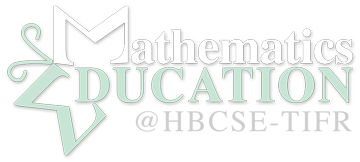Consistent with our approach to strengthen overall capacities and identities of teachers as professionals, and consistent with policy documents such as NCFTE, the following principles guide the conception, design and enactment of professional development programs for mathematics teachers.
1. Situatedness in the work of teaching
The aspect of situatedness (maintaining relevance to the work that the teachers do) is addressed through designing tasks centred around artifacts such as: students’ errors, examples from textbook, live or video teaching records, etc.
2. Offering challenges to revisit teacher knowledge and beliefs
Teachers are encouraged to revisit their knowledge and beliefs through offering prompts and challenges in the tasks. The teacher educator facilitates discussions among teachers that involve probing mathematical ideas, providing counterarguments, asking for counter examples, asking for explanations, clarifying mathematical vocabulary and definitions, reading and reflecting on the work of teaching in research, etc.
See here: Research readings for teachers
